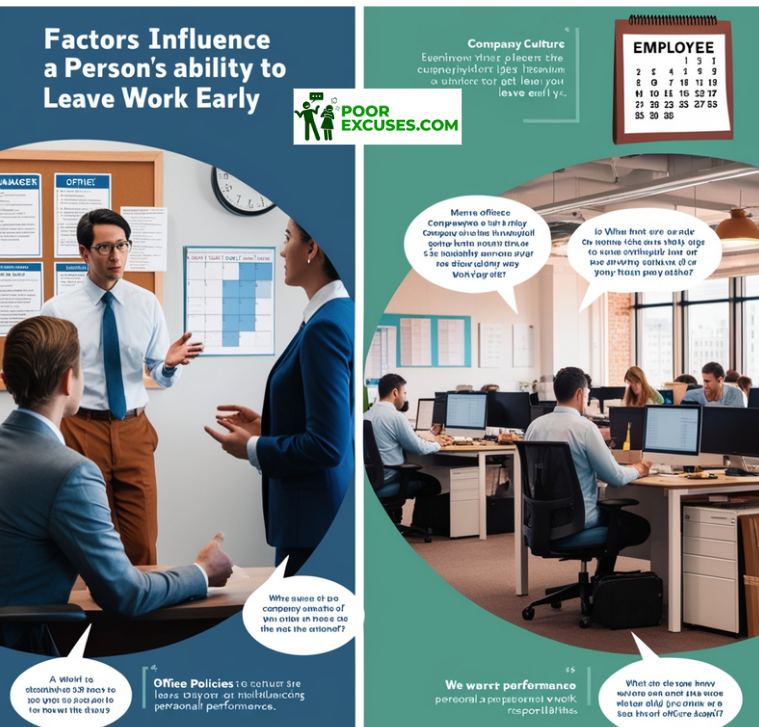Leaving work early can stir up a mix of emotions. You might be facing family commitments, feeling under the weather, or simply needing a moment to recharge. It’s tough to prioritize your own needs without feeling guilty. However, knowing the best reasons to leave work early can make all the difference.
Everyone has valid reasons for needing to step away from their desk. Life is unpredictable, and sometimes you just need to take care of yourself. In this article, we’ll highlight some of the best excuses that are not only reasonable but also acceptable in a professional setting.
These reasons can help you confidently request that early exit, allowing you to focus on what truly matters. Let’s get into the eight best reasons to leave work early and empower you to take the time you deserve!
Importance of Leaving Work Early

Leaving work early can significantly impact your overall well-being. When you leave work early, you’re not just giving yourself a break; you’re enhancing your productivity and mental health.
Taking time off allows you to recharge, which can lead to improved focus and creativity when you return. Studies show that regular breaks reduce stress and prevent burnout. By prioritizing your mental health, you set the stage for better performance in the long run.
Moreover, having good excuses to leave work early—such as attending to personal matters or health appointments—can foster a healthier work environment. It shows that you value both your well-being and your responsibilities.’
Incorporating time away from your desk can also boost morale. It encourages a culture where employees feel empowered to take necessary breaks, leading to a more engaged workforce.
As we delve deeper into this topic, let’s go through how to effectively compartmentalize your tasks and stay organized to maximize the benefits of leaving work early.
The 8 Best Reasons to Leave Work Early
1. Prioritizing Health: Medical Appointments
Your health should always come first. Scheduling medical appointments during work hours can be essential, especially for routine check-ups or urgent consultations. It’s not just about physical health; it’s a proactive step towards a better you.
2. Addressing Family Emergencies
Life is unpredictable. Family emergencies can pop up without warning, demanding immediate attention outside of work. If you have a home emergency or need to pick up your child from school, this is a strong justification.
Even if it’s a loved one needing support or a situation that requires your presence, prioritizing family is crucial. This is a valid reason to leave work early.
3. Managing Childcare Issues
When your child is unwell or school unexpectedly closes, the need to leave work early becomes clear. Parents often juggle multiple responsibilities, and sometimes, children come first. Ensuring their well-being means taking a step back when necessary. This is one of the best reasons to leave work early.
4. Focusing on Personal Well-Being
Mental health is just as important as physical health. Sometimes, taking a mental health day or stepping away for self-care is vital. Recharging your mind can lead to greater productivity and a more positive work environment.
5. Responding to Home Repairs or Emergencies
Imagine coming home to a plumbing disaster or a broken appliance. Urgent home repairs often require immediate attention, and leaving work early can save you from further complications. Addressing these issues promptly ensures a smoother home life.
6. Committing to Educational Obligations
Investing in yourself through education is key to career growth. Attending classes or important professional development meetings can open doors.
Making time for these commitments is not just beneficial; it’s necessary for your future.
7. Using Transportation Problems
Car troubles or delays in public transport can throw a wrench in your day. Sometimes, these issues arise unexpectedly, and leaving work early may be the only solution to avoid further complications and stress. this could be a good excuse to leave early.
8. Seizing Networking Opportunities
Opportunities don’t always wait for a convenient time. Networking events or career-enhancing gatherings can arise, and attending them can significantly impact your professional trajectory. Making room for these events can lead to valuable connections.
With so many compelling best reasons to leave work early, how do you organize your time to accommodate these needs? Let’s check some strategies for compartmentalizing tasks and keeping everything in balance.
Tips for Requesting to Leave Early

When you need to leave work early, how you approach your supervisor matters. Start with respect; they’re more likely to be understanding if you show consideration for their time and workload.
- Be Honest and Direct
Communicate your reason. Whether it’s a medical appointment or a family emergency, providing context helps your supervisor understand your situation. Honesty builds trust and makes your request more legitimate.
- Timing is Key
Choose the right moment to make your request. Avoid busy times or stressful situations. Instead, find a calm moment when your supervisor is more likely to listen and be receptive to your needs.
Preparing Your Case
Before you approach your manager, be ready to discuss how your work is complete for the day. This shows responsibility and reassures your supervisor that you’re not just trying to leave early for frivolous reasons. Mentioning that you plan to stay late another day to make up for lost time can also help.
- Offer Solutions
If possible, propose how your work can be managed in your absence. Maybe you can finish a task early or delegate responsibilities. Showing that you’ve thought about the impact of your absence demonstrates responsibility.
- Keep It Professional
Maintain a professional tone, even if you’re close with your supervisor. This reinforces the seriousness of your request. Avoid oversharing personal details; a brief explanation is often sufficient. Avoid using a bad excuse.
- Follow Up
After your request, thank your supervisor for their understanding. If you need to leave early frequently, keep them updated on your situation. This shows appreciation and helps maintain a positive relationship.
These conversations can be tricky, but with the right approach, you can manage them smoothly. Next, let’s discuss how to keep your tasks organized, ensuring that leaving early doesn’t disrupt your workflow.
Common Missteps
While some reasons are effective, others might be viewed as bad excuses to leave work. For instance, using a hangover as an excuse can harm your professional reputation. It’s crucial to avoid reasons that could jeopardize your standing or lead to disciplinary action, such as the fear of being fired for leaving without a solid explanation.
Things That May Affect Your Chance to Leave Early

Leaving work early can be a necessity for many employees. However, various factors can influence your ability to do so. Understanding these elements can help you navigate your request to leave more effectively.
1. Company Policies
Each organization has specific policies regarding leaving work early. Familiarize yourself with your company’s guidelines. Knowing the rules around sick leave, personal time, and legitimate reasons for leaving can strengthen your case. Make sure you’re aware of any procedures you need to follow to ask your manager for early leave.
2. Your Manager
The way your manager handles requests significantly impacts your chances to grant your request. If your supervisor values open communication, expressing your need to leave work early may be received positively. Always approach them with respect and clarity when you want to leave. When you articulate your excuse to leave work early, be prepared to provide context, such as completing your tasks or needing to attend to a pressing matter.
3. The Kind of Worker You Are
Your work ethic plays a crucial role in how your request is perceived. If you consistently demonstrate reliability and ensure your work is complete, you’ll likely have a better chance of being granted early leave. Your past performance can create trust, making it easier to ask to leave early when personal situations arise. this can also determine if you can go home early.
4. The Company Culture
A supportive company culture can make a significant difference in how your request is handled. Organizations that prioritize employee well-being often encourage taking necessary breaks. If your workplace promotes a balance between professional commitments and personal life, it’s easier to articulate your good excuse for leaving early, whether it’s for a networking event, a family issue, or even a mental health break.
Keeping Your Tasks Organized to Ensure a Smooth Workflow

Staying organized is key to maintaining productivity, especially when you need to leave work early. Here are some practical strategies to help you manage your tasks and remote work effectively:
Prioritize Your To-Do List
Start each day by identifying your most important tasks. Use a simple ranking system—like high, medium, and low priority—to focus on what truly matters. This ensures that even if you leave early, your critical tasks are completed.
Utilize a Digital Calendar
A digital calendar can be your best friend. Schedule deadlines, meetings, and reminders. Block out time for important tasks, and make sure to account for any early departures. This visual representation of your schedule keeps you on track.
Set Clear Boundaries
When you know you’ll be leaving early, communicate with your team about your availability. Setting clear boundaries helps others understand your schedule and reduces interruptions, allowing you to work more efficiently.
Break Tasks into Manageable Chunks
Large projects can feel overwhelming. Break them down into smaller, manageable tasks. This not only makes them easier to tackle but also allows you to make progress even if you only have a short amount of time.
Timing and Communication
The time to ask to leave is just as important as the reason. Choose a calm moment to let your manager know about your need to leave early. Being proactive in your communication can increase the likelihood that they’ll grant your request.
When requesting to leave work early, be honest. If you say you need to leave to check on a home emergency or manage personal tasks, provide context without oversharing. A straightforward approach builds trust and may make your manager more likely to let you leave early.
Regularly update your team on your progress. If you’re working on a collaborative project, ensure everyone knows your availability. This way, they can plan around your schedule, and you won’t leave anyone in the lurch.
Prepare for the Next Day
Before you leave, take a few minutes to set up for the next day. Jot down what needs to be done and prioritize tasks for when you return. This simple act can help you hit the ground running when you’re back at work.
By implementing these strategies, you can maintain productivity and ensure that your workflow remains uninterrupted, even when you need to leave early. Balancing personal needs with professional responsibilities is crucial, and being organized makes it all possible.
End Note
Leaving work early is sometimes necessary for health reasons, family emergencies, or personal commitments. By understanding the valid reasons for stepping out and approaching your supervisor respectfully, you can navigate these situations with confidence. Ask to leave work early, don’t wait for the last minute.
Coupled with effective task management, you can ensure that your productivity remains intact, even when life throws unexpected challenges your way, don’t leave early without permission.
Now, it’s your turn! Reflect on your workplace practices. How do you manage your tasks and communicate your needs?
Share your tips in the comments below, and let’s support each other in creating a healthier work-life balance. Remember, taking care of yourself ultimately benefits not just you, but your entire team!



2 comments
[…] what’s best for you. Listen to your body and prioritize your health when considering a reason to miss work for a […]
[…] a family obligation, you can express genuine surprise: “I can’t believe I forgot! I need to leave early to attend to a family […]
Comments are closed.